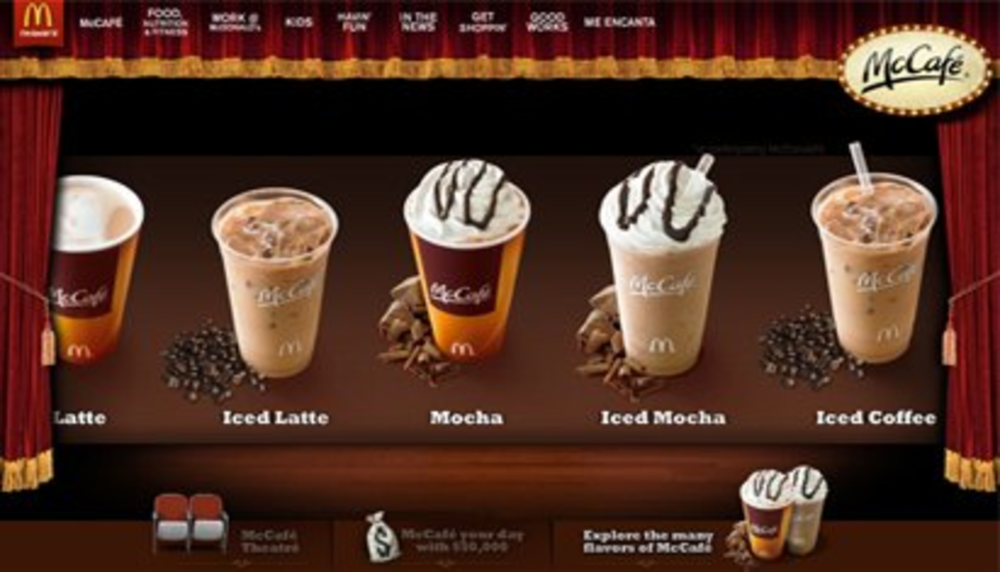Coffee has always been a “social” product: We ask people out with offers of coffee dates, and we meet up at the local coffee shop for business. McDonald’s national McCafé launch brought coffee to another level of sociability by leveraging social media and digital, viral components on a massive scale. But other coffee sellers, such as Starbucks, Dunkin’ Donuts and smaller companies, such as Green Mountain Coffee, are all exploring some form of social media as well.
A brand new McCafé Web site, replete with shareable (on Facebook, Reddit, etc.) videos, was unveiled. The site also hosts an interactive sweepstakes which asks consumers to submit stories and photos on why they deserve to win the $50,000 grand prize Visa Gift card. In addition, McCafé launched a Twitter account at McCaféYourDay. As of press time, McCaféYourDay had 134 followers. Starbucks, by comparison, has 172,304 , and Dunkin’ Donuts — whose extreme Twittering has been well-documented — has 19,575.
“We’re having a lot of fun online, and there’s a great dedicated area for McCafé on the McDonald’s Web site with some really quirky fun things,” said Sofia Therios, director of marketing for McDonald’s USA.
“It’s been our mentality that slow and steady wins the race with social media,” she added. “We really aggressively started looking at social media for the whole McDonald’s brand late last year and wanted to make sure we had the right resources to engage our customers in ways that are relevant.”
She added that McDonald’s is mostly expecting McCafé adoption — and growth in sales revenue — from its existing customer base and is not concerned with “competing” for coffee drinkers.
For more targeted pushes, McDonald’s has added McCafé features to its specialized mini-sites for different demographic groups. African American consumers get the pitch on 365 Black, featuring customized McCafé music from neo-soul artist Dwele. Hispanic consumers can learn more on MeEncanta, and Asians are targeted through MyInspirAsian. McDonald’s is also sending targeted e-mail blasts in English and Spanish to McDonald’s customers who are already signed up to receive messages and promotions.
Starbucks’ social approach has been a bit more subtle, and the coffee giant is mainly pushing back McDonald’s through print and outdoor ads from BBDO.
Starbucks’ latest campaign in the battle of brewers focuses on “story telling,” and it kicked off with a little Starbucks story of its own: a blog post by Terry Davenport, SVP of marketing, and a YouTube video featuring Howard Schultz, chairman, president and chief executive officer. The chain also is communicating directly to its 1.5 million friends on Facebook.
“As a leader in the coffee category, it is not surprising that other companies are looking to compete for our coffee customers,” spokesperson Bridget Baker said of the campaign. “A few are making claims that just don’t add up, so it’s time for Starbucks to tell our story by using facts about our brand to turn up the volume.
“Others have tried to define us, and now is the right time to tell our story in our way, highlighting our exceptional coffee, the unique experience, and the values that have built our brand from the beginning, she said. “What is new is that we’ll bring our story to life through the facts, and we’ll turn up the volume in lots of media channels. We will take advantage of the multiple proof points and creative executions to tell our story.”
Smaller coffee-sellers, like Bruegger’s Bakery — a café/bakery with locations spanning 24 states — have been more hesitant to jump on the social media bandwagon, preferring traditional outreach like in-store marketing and direct mail.
“We’re not trying to change what we do or respond to these ‘coffee wars’ in any way,” said Tom Piper, director of marketing. “I am very confident that you will see more social media experiments from us: Facebook, Twitter, mobile and probably some online ad placements, but we’re not walking away from traditional vehicles.”
Green Mountain Coffee, which sells online and in catalogs but not through any Green Mountain-branded cafes, also is exploring the social media landscape. Its efforts are focused on home brewers, whose numbers have increased 5% this year (per the National Coffee Association). The coffee seller has a Facebook page, a blog on its site and two Twitter accounts: GreenMtnCoffee, which is more promotion-oriented, and BrewBetterWorld, which talks up the company’s social and environmental initiatives.
“We’ve found social media channels to be a great way to interact with coffee lovers,” summed up Sandy Yusen, spokesperson for Green Mountain.








